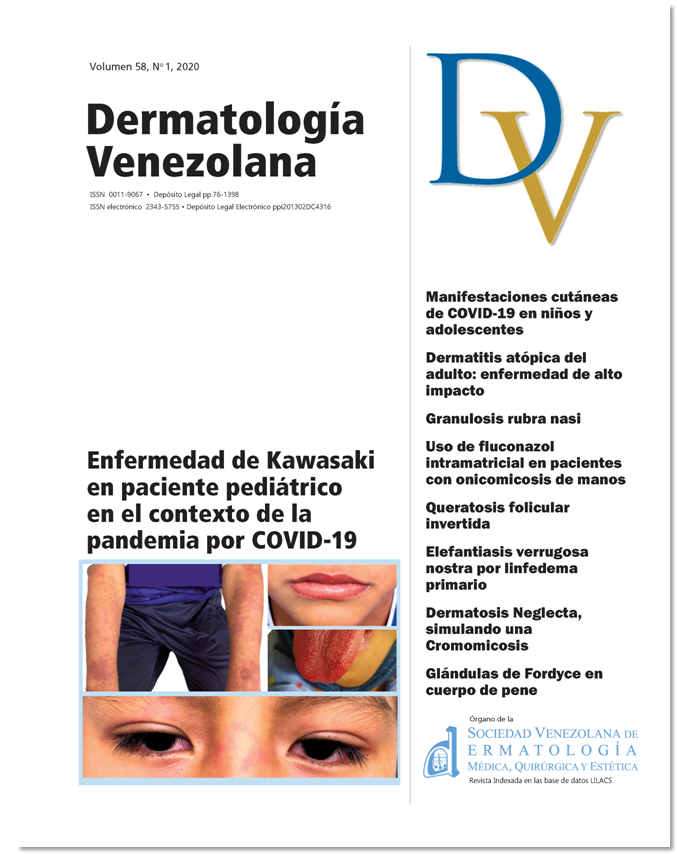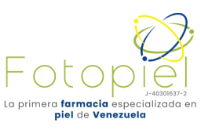Experiencia con el uso de fluconazol intramatricial en pacientes con onicomicosis: una opción terapéutica novedosa
Palabras clave:
Onicomicosis, tratamiento intramatricial, fluconazol, ensayo clínico, tratamiento novedosoResumen
Introducción: La onicomicosis es una infección crónica y recurrente que afecta las uñas y es producida por diversos tipos de hongos. Se han descrito múltiples esquemas de tratamientos sistémicos y tópicos, sin embargo, el porcentaje de éxito terapéutico es limitado. El uso intramatricial de fluconazol es una técnica novedosa que parece prometedora y se propone como mecanismo terapéutico por su mayor biodisponibilidad en el tejido infectado. Objetivo: Evaluar la respuesta de fluconazol intramatricial, en el pliegue ungueal proximal, en pacientes con onicomicosis. Metodología: Estudio clínico prospectivo de pacientes provenientes de la consulta de Micología del Servicio de Dermatología del Instituto de Biomedicina con diagnóstico de onicomicosis a través de la clínica, examen directo y cultivo micológico, sin cumplimiento de tratamiento sistémico o tópico un mes previo, a quienes se les aplicó fluconazol intramatricial en uñas afectadas, de forma semanal, con observación de respuesta clínica y registro fotográfico en cada visita. Resultados: Del total de 23 pacientes, 8 (35%) presentaron una respuesta excelente y 7 (31%) reportaron buena respuesta, mientras que 4 (17%) obtuvieron una respuesta regular y 4 (17%) no respondieron al tratamiento. Se diagnosticaron 45 onicomicosis, de las cuales 30 afectaban las uñas de las manos. La mayoría de los pacientes experimentaron disconfort al momento de la inyección, sin reporte de reacciones adversas sistémicas. Conclusión: La terapia intramatricial con fluconazol, ha demostrado ser una alternativa terapéutica efectiva y tolerable para los pacientes con onicomicosis.
Summary
Use of intra-matrix fluconazole in patients with onychomycosis of the hands: an innovative therapeutic option
Introduction: Onychomycosis is a common infection that affects the nails and it is caused by various types of fungi. Multiple schemes of systemic and topical treatments have been described; however, the percentage of therapeutic success is variable, obtaining optimal responses in some cases and, in others, poor therapeutic response and even recurrences. Intra-matrix use of fluconazole is an innovative technique that seems promising and is proposed as a therapeutic mechanism because of its greater bioavailability in infected tissue. Objective: To evaluate the response of intra-matrix fluconazole, in the proximal nail fold, in patients with onychomycosis of the hands. Methodology: cuasi-experimental, prospective and cross-sectional study of patients from the Mycology Section of the Dermatology Service of the Instituto de Biomedicina with diagnosis of onychomycosis through the clinic, direct examination and mycological culture, without prior systemic or topical treatment in the last one month, who were applied intra-matrix fluconazole on the affected nails, on a weekly basis, with clinical response observation and photographic record at each visit. Results: Of the total of 29 onychomycosis diagnosed, 11 nails (38%) presented an excellent response, and 8 (27%) showed a good response, while 4 (14%) obtained a regular response, and 6 affected nails (21%) did not respond to the treatment. The majority of patients experienced discomfort at the time of injection, without reporting systemic adverse reactions. Conclusion: Intra-matrix therapy with fluconazole has proven to be an effective and tolerable therapeutic alternative for patients with onychomycosis. Key words: Onychomycosis, intra-matrix treatment, fluconazole, experimental study, innovative therapeutic.
Descargas
Archivos adicionales
- Carta dirigida al editor de la revista
- Imagen 1
- Imagen 2A. Antes del tratamiento
- Imagen 2B. Después del tratamiento
- Imagen 3A. Antes del tratamiento
- Imagen 3B. Después del tratamiento
- Imagen 4A. Antes del tratamiento
- Imagen 4B. Después del tratamiento
- Imagen 5A. Antes del tratamiento
- Imagen 5B. Después del tratamiento
- Imagen 6
Publicado
Número
Sección
Licencia
Publicado por la Sociedad Venezolana de Dermatología Médica, Quirúrgica y Estética







